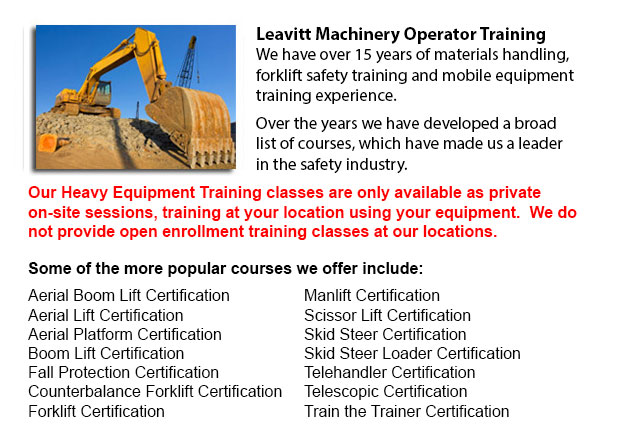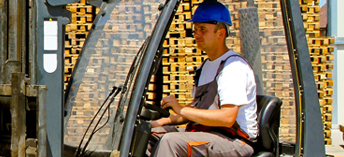
Kingston Heavy Equipment Operator Certification - The person who manipulates the controls and drives various types of heavy equipment is referred to as a heavy equipment operator. Most commonly, this machinery is utilized on construction sites to be able to lift and deliver heavy supplies and in order to move earth and perform construction work. Heavy industrial machinery could consist of backhoes, cranes, bulldozers and excavators. The operator has to adhere to safety procedures because he maneuvers the machine to finish his job. He might be the sole equipment operator on the jobsite or as part of a team.
A heavy equipment operator will make use of different construction equipment, depending upon the nature of the job at hand. The huge machinery are built to perform specific tasks in the most efficient manner for every industry. Various types of machinery are small enough to be used inside of warehouses or within plants, and may be particularly designed to move boxes and pallets. Bigger equipment is normally utilized outdoors to grade land and clear areas to prepare for construction.
There are several projects which need the skill of a heavy equipment operator, such as public works projects and endeavors of privately owned businesses. Tasked carried out by public works offices may include road construction and the building of bridges. There are many other publicly funded projects that comprise airport runways, dam construction, power plants, municipal structures and levees. Private projects can comprise the construction of office buildings, malls, industrial parks and retail stores.
Small scale tasks would usually need heavy machinery to be used within huge industrial spaces or in commercial buildings. The machinery which would be used in this particular instance, includes forklifts, cherry pickers and pallet jacks. Trenchers and backhoes are often available in different sizes appropriate for tasks requiring less bulky and powerful machinery.
Usually, a heavy equipment operator is needed to be certified by regional or local agencies. Some are cross-trained and certified to operate a variety of different machine kinds. Others prefer to specialize in operating only one kind of equipment and only need periodic updates on their operating permit certifications.
The employers working in this industry operating heavy equipment would typically be trained by taking a formal apprenticeship course or by receiving on-the-job training by their unions or companies. It is essential that employers hire completely-trained heavy equipment operators to adhere to local guidelines and adhere to local and regional laws regarding worker safety and job conditions.
-
Narrow Aisle Forklift / Order Picker Training / Electric Pallet Jack / Electric Pallet Truck Training in Kingston
A pallet lift is a piece of equipment dedicated in the moving of pallets of various dimensions and weights. They might be utilized as an accessory for forklifts, cranes and other styles of heavy machinery or be applied on their own. Pallet lifts are... More -
Kingston Forklift Training School
Kingston Forklift Training School - Forklift Training School - Industry and federal regulators have established the criteria for forklift safety training based on their existing regulations and standards. People wishing to operate a forklift must fin... More -
Kingston Scissor Lift Certification
Kingston Scissor Lift Certification - Scissor lift platforms are utilized at work locations to enable tradespeople - such as iron workers, welders and masons - to reach their work. Making use of a scissor lift platform is usually secondary to their t... More -
Kingston Boom Lift Safety Training
Kingston Boom Lift Safey Training - Boom lifts are a type of elevated work platform or aerial lifting device that are normally utilized in warehousing, construction and industry. Boom lifts could be made use of in practically whichever environment du... More -
Kingston Fall Protection Ticket
Kingston Fall Protection Ticket - Fall-related incidents are the number one reason of death in the construction business. The possibility for fall accidents very much increases based upon the type of work which is being accomplished within your workp... More -
Telehandler Training in Kingston
Telescopic handlers normally called telehandlers for short, are an extremely popular piece of heavy construction machinery. They are widely utilized in the construction and agricultural trades. These machines have farthest reaching ability and are ab... More -
Kingston Warehouse Forklift Training Programs
Kingston Warehouse Forklift Training Programs - Warehouses could either be retail, industrial or commercial facilities, functioning from bulk product retailing to product distribution services. Regardless of the type of warehouse, personnel inside wa... More -
Kingston Heavy Equipment Ticket
Kingston Heavy Equipment Ticket - Depending on the nature of the job at hand, the kind of construction machinery that a heavy equipment operator utilizes varies. Every type of equipment is built to do particular jobs in the most effective method comm... More

Forklift Certification Kingston
TOLL FREE: 1-888-254-6157
Kingston, Ontario
forkliftcertificationkingston.com
Email Us
About Us


